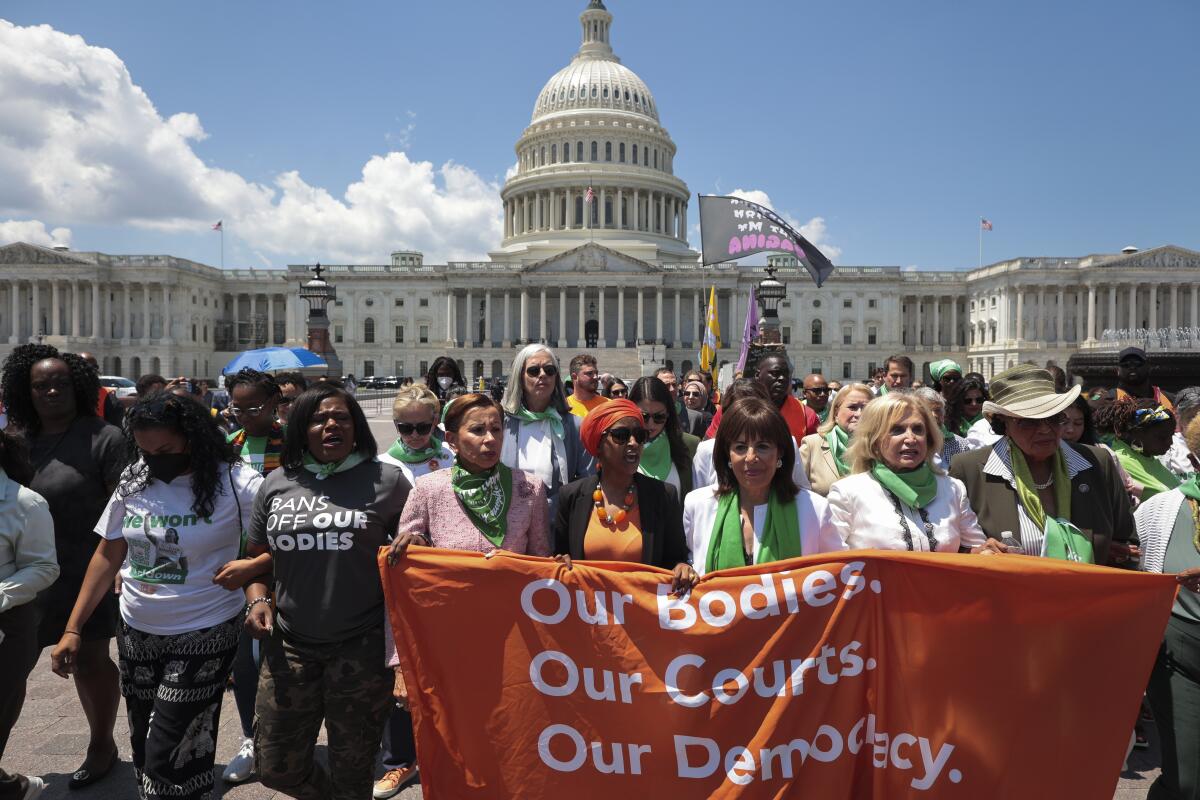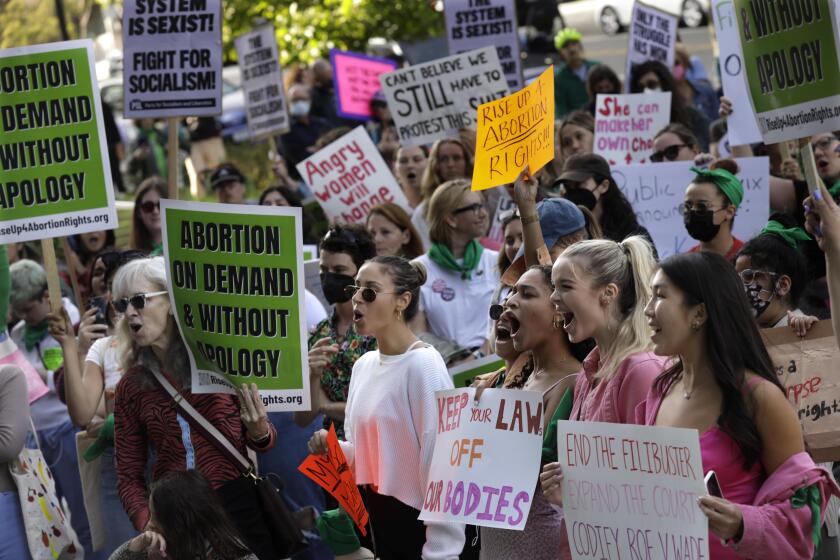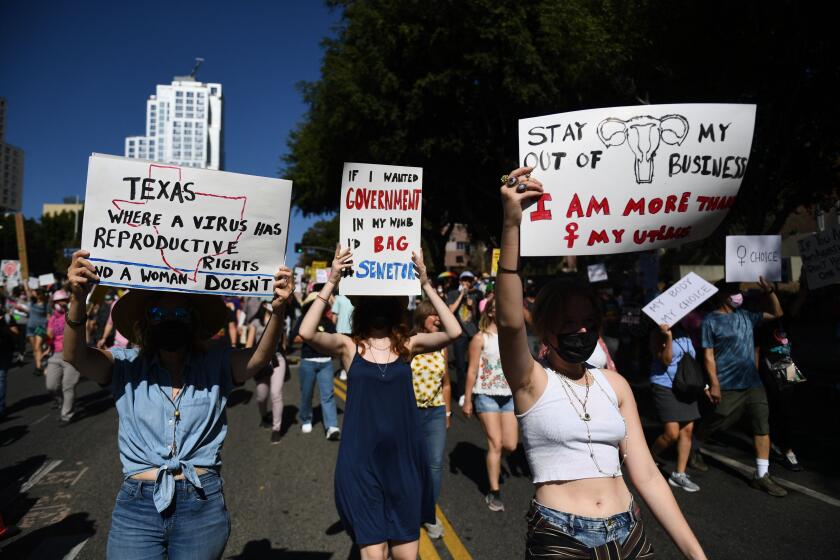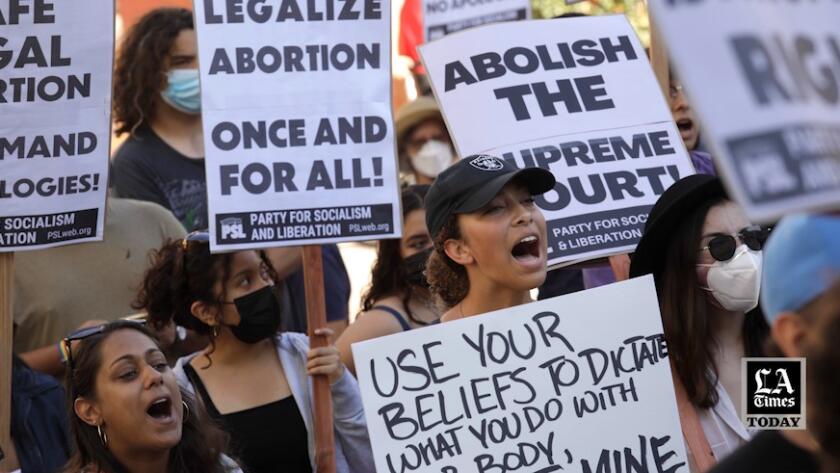Jews, Muslims and others say Roe vs. Wade reversal threatens their religious freedom

- Share via
For 25 years Rabbi Barry Silver has served as the spiritual leader of L’Dor Va-Dor, a progressive synagogue in Boynton Beach, Fla. Like most congregational rabbis, he offers a Jewish perspective on major life events, giving weekly sermons, performing weddings, funerals and baby namings, and occasionally counseling congregants wrestling with whether to have an abortion.
Silver tells his congregation that contrary to Roman Catholic and evangelical teachings, which state that life begins at conception, traditional Jewish law, known as Halakha, says life begins at birth: when the baby draws its first breath. Before then, the mother’s physical and emotional well-being is paramount.
In some extreme cases — such as when the mother’s life is at stake — an abortion is not just permitted by Jewish law, but required.
“Right in the beginning of the Torah, Genesis states that God formed the human, Adam, from the dust of the Earth, like you create a work of pottery. Then he breathed the breath of life in him and he lived,” Silver said. “We equate breathing with living.”
For decades, antiabortion Catholic and evangelical Christian perspectives have dominated the religious conversation around abortion. But people of faith hold a variety of views on the issue, rooted in their own traditions, teachings and laws.
Muslim teachings hold that the soul is breathed into a fetus 120 days after conception, and other religious groups — Unitarians, the Oklevueha Native American Church, and the Satanic Temple (a global organization that is headquartered in Salem, Mass., and that, despite its name, doesn’t actually worship the Prince of Darkness) — considerreproductive choice and bodily autonomy to be sacred.
Here’s everything you need to know about the U.S. Supreme Court’s decision on Roe vs. Wade.
Even Catholics are far from united in their views on the issue, with 56% saying abortion should be legal in all or most cases, according to a 2019 Pew Research Center survey.
Silver, a progressive activist who also works as a civil rights attorney, made headlines this month after he filed a religious liberty lawsuit challenging a Florida law that bans abortions after 15 weeks of pregnancy. He said the ban makes abortion unlawful even in situations in which it’s mandated by Jewish law. Silver is the first religious leader to file such a suit; legal experts say that after the U.S. Supreme Court’s June 24 decision overturning Roe vs. Wade, he won’t be the last.
“One hundred percent, we’re just at the beginningof the religious liberty lawsuits,” said Candace Bond-Theriault, director of racial justice policy with the Law, Rights, and Religion Project at Columbia Law School.
Leaders of religious organizations are talking internally and with one another about what the court’s reversal of Roe in its Dobbs vs. Jackson ruling means for religious freedom. At stake, they say, is not just the free exercise of their religious beliefs, but also the fear that a single theological perspective will dictate state and federal law.
“If the Dobbs decision was based on an evangelical understanding of when life begins, then that’s a slippery slope,” said Rahmah Abdulaleem, executive director of Karamah: Muslim Women Lawyers for Human Rights. “Muslims don’t drink at bars, but we don’t say you can’t. We need to respect the diversity of faiths.”
Jews in particular are waking up to what abortion restrictions at the state level could mean for their religious freedom, said Rachel Laser, the first Jewish president of Americans United for Separation of Church and State, a group founded primarily by Protestants in 1947 in response to a Supreme Court decision allowing indirect support of religious education.
“A lot of us don’t necessarily on a conscious level equate our views toward
reproductive justice with Judaism, but there is a growing recognition that there is a dissonance between the moral code being imposed by our government and the moral code that is still rooted in many of the values of Judaism,” Laser said.
Jewish laws outlining the circumstances under which abortion is permitted go back to the 2nd century, and in the more recent past, Jews have been among the most ardent supporters of abortion rights in America. In a 2014 Pew survey, 83% of Jewish respondents agreed that abortion should be legal in all or most cases, compared with 62% of all Americans today.
States will now be permitted to ban abortions for the first time since the landmark Roe vs. Wade decision in 1973. What does this mean in California?
“In Jewish law, life comes before everything, and when it comes to matters of maternal health, the life and health of the mother always comes before the potential life of the fetus as a general rule,” said Daphne Lazar Price, executive director of the Jewish Orthodox Feminist Alliance. “Jewish texts don’t look at the number of weeks or trimesters — until the fetus emerges from the womb, the mother’s life is privileged.”
Lazar Price says this perspective is religious, not political.
“It’s not partisan; it’s about the health of the mother,” she said.
Michael Helfand, a professor at Pepperdine University’s Caruso School of Law, says Jews are well positioned to argue that abortion restrictions violate an individual’s religious liberties, especially in states where so-called religious freedom restoration laws provide heightened protections for religious exercise.
The federal Religious Freedom Restoration Act was passed by Congress in 1993 with overwhelming bipartisan support after the Supreme Court ruled against two Indigenous Americans who were denied unemployment benefits by the state of Oregon after being fired from their jobs for consuming peyote as part of a religious ceremony.
Peyote was not legal in Oregon, but the men argued that their use of the plant — revered as sacred medicine and taken in an all-night ritual accompanied by instruments and song — was protected by the free exercise clause of the 1st Amendment. The Supreme Court said that because peyote was illegal for everyone in the state, the law did not target those who use it in religious ceremonies, so it was acceptable for the state to deny them unemployment benefits.
The Religious Freedom Restoration Act essentially said that if a law places a substantial burden on a religious practice, the government must prove there is not a less restrictive alternative. For example: providing a religious exemption to Indigenous people who take peyote as part of a ritual.
“In enacting [the religious freedom law], Congress recognized that all
religious practitioners merit the respect called for by the free exercise clause,” said Rebecca Tsosie, who teaches federal Indian law and constitutional law at the University of Arizona. “It was one of those moments when people felt that all religions have to be protected.”
Marjorie Dannenfelser started out as a pro-choice Republican. After changing her mind in college, she set out to outlaw abortion across the United States.
Whether Florida’s Religious Freedom Restoration Act will help Silver’s case is still to be determined, but Helfand says he believes the lawsuit it is too garbled to be successful.
“It tries to take a little religious liberty and a little separation of church and state and mash them up,” he said. “It’s not the best way to advance in court.”
Silver says he is working with lawyers on refiling the suit and has received commitments from other religious organizations to sign on. Other groups say they need more time to formulate a strategic argument.
“Americans United is looking at all the options, but I think there is a really powerful argument to be made under the establishment clause that says a government can’t play favorites when it comes to religion,” Laser said. “I think that’s a very intuitive argument to make, and very powerful.”
The Jewish Orthodox Feminist Alliance is in preliminary talks about taking legal action as well, Lazar Price said.
“There’s nothing I can share publicly, but suffice it to say there are faith groups across the religious spectrum in this country who are alarmed by developments of the past couple of weeks and where they are going,” she said.
Edward Ahmed Mitchell, deputy director of the Council on American-Islamic Relations, says his organization is discussing how and whether to weigh in on the Dobbs decision.
“I think many Muslim organizations are reevaluating the issue of abortion in the wake of Roe vs. Wade and considering if they need to get involved in this discussion and how — including us,” he said.
A recent survey conducted by the group shows that Muslim respondents hold divergent opinions on whether and how state laws should regulate abortion. A small minority — 13.7% — said they would support laws allowing abortion at any stage of pregnancy without any restrictions. An even smaller share — 7.2% — said they would support laws that prohibit abortion entirely. Between these two extremes, respondents were fairly evenly spread.
Abdulaleem, the executive director of Karamah, says these inquiries around abortion are new.
“The everyday average Muslim did not know what Islam’s law was on abortion,” she said. “So now, thinking people are educating themselves on what Islamic law says about it.”
The answer is not entirely straightforward, says Ismail Royer, director of the Islam and Religious Freedom Action Team at the Religious Freedom Institute. There are four major schools of thought in Islam, and each offers a different interpretation of sacred laws, including when it’s permissible to get an abortion.
- Share via
Watch L.A. Times Today at 7 p.m. on Spectrum News 1 on Channel 1 or live stream on the Spectrum News App. Palos Verdes Peninsula and Orange County viewers can watch on Cox Systems on channel 99.
Where they agree, however, is that abortion is categorically forbidden 120 days after conception except to save the mother’s life, because this is when Islam teaches that the soul is breathed into the fetus, he said.
From Royer’s perspective, even the most restrictive state laws on abortion would not infringe on Muslims’ ability to practice their religious beliefs.
“The only question where the rubber meets the road here is a law that requires a woman to die in childbirth to save a fetus’ life,” he said. “That is the single scenario in which a question of religious liberty would come up.”
Asifa Quraishi-Landes, a professor at the University of Wisconsin-Madison who specializes in comparative Islamic and U.S. constitutional law, disagrees.
“Under Roe, I, as a Muslim, had the choice to pick among my religious practices and values,” she said. “But if Islam tells me I have 120 days and the state says I don’t, that feels like an infringement.”
Abdulaleem says that although she does not foresee Karamah submitting its own religious liberty lawsuits, it may sign on to amicus briefs in support of others.
“Just because Catholics believe that life begins at conception, they can’t make that the rule for everyone,” she said. “A lot of Muslims are thinking about what will happen to the separation of church and state if the wall is this easy to penetrate.”
In another sector of the American religious landscape, the Satanic Temple, founded in 2013, began fighting abortion restrictions in state courts before Roe vs. Wade was overturned, and currently has two cases moving forward in Texas.
“We’re making a simple free-exercise claim,” said Lucien Greaves, who co-founded the temple. “Our argument is that abortion restrictions were predicated explicitly on the religious notion that life begins at conception, and that’s not a point of view we agree with or that should be confirmed by the government.”
Members of the temple — about 700,000 worldwide — do not believe in the existence of Satan or the supernatural. They do believe in religious freedom and pluralism. Over the last nine years, they have been embroiled in several court battles to ensure their right to the same religious freedoms as others.
“I don’t feel like religious liberty is meant to only benefit religious groups,” Greaves said. “What we usually see are not religious liberty requests, but requests for exclusive rights for one religion.”
Philosophically, Satanic Temple members are guided by seven tenets, including Tenet III — “One’s body is inviolable, subject to one’s own will alone” — and Tenet V — “Beliefs should conform to one’s best scientific understanding of the world. One should take care never to distort scientific facts to fit one’s beliefs.”
“The reference to body autonomy and science puts the decision of whether to terminate a pregnancy or not clearly in the hands of the pregnant person,” Greaves said.
In 2020, the group developed an abortion ritual that involves looking at oneself
in the mirror and repeating Tenets III and V before and after an abortion. The goal, it said, is to affirm bodily autonomy and dispel notions of guilt, shame and mental discomfort that can rise up when having an abortion.
The group also contends that state-mandated sonograms and waiting periods before being able to procure an abortion interfere with its members’ ability to perform the abortion ritual.
Ultimately, however, legal experts say it’s still unclear exactly how religious groups will litigate for abortion rights and how many will take this on.
Bond-Theriault at Columbia Law School says that although she is certain there will be a deluge of religious liberty lawsuits around abortion, she expects that most of them won’t happen right away. The Dobbs decision is still new, and it’s not yet clear what laws will be passed in which states, or how those laws will be implemented.
“People are upset and angry, but right now it’s become the Wild West of case litigation and theory,” she said. “We’re here for the long haul, and we’re thinking strategically about how to do this in a way so we can include as many people under the tent as possible.”
More to Read
Sign up for Essential California
The most important California stories and recommendations in your inbox every morning.
You may occasionally receive promotional content from the Los Angeles Times.















